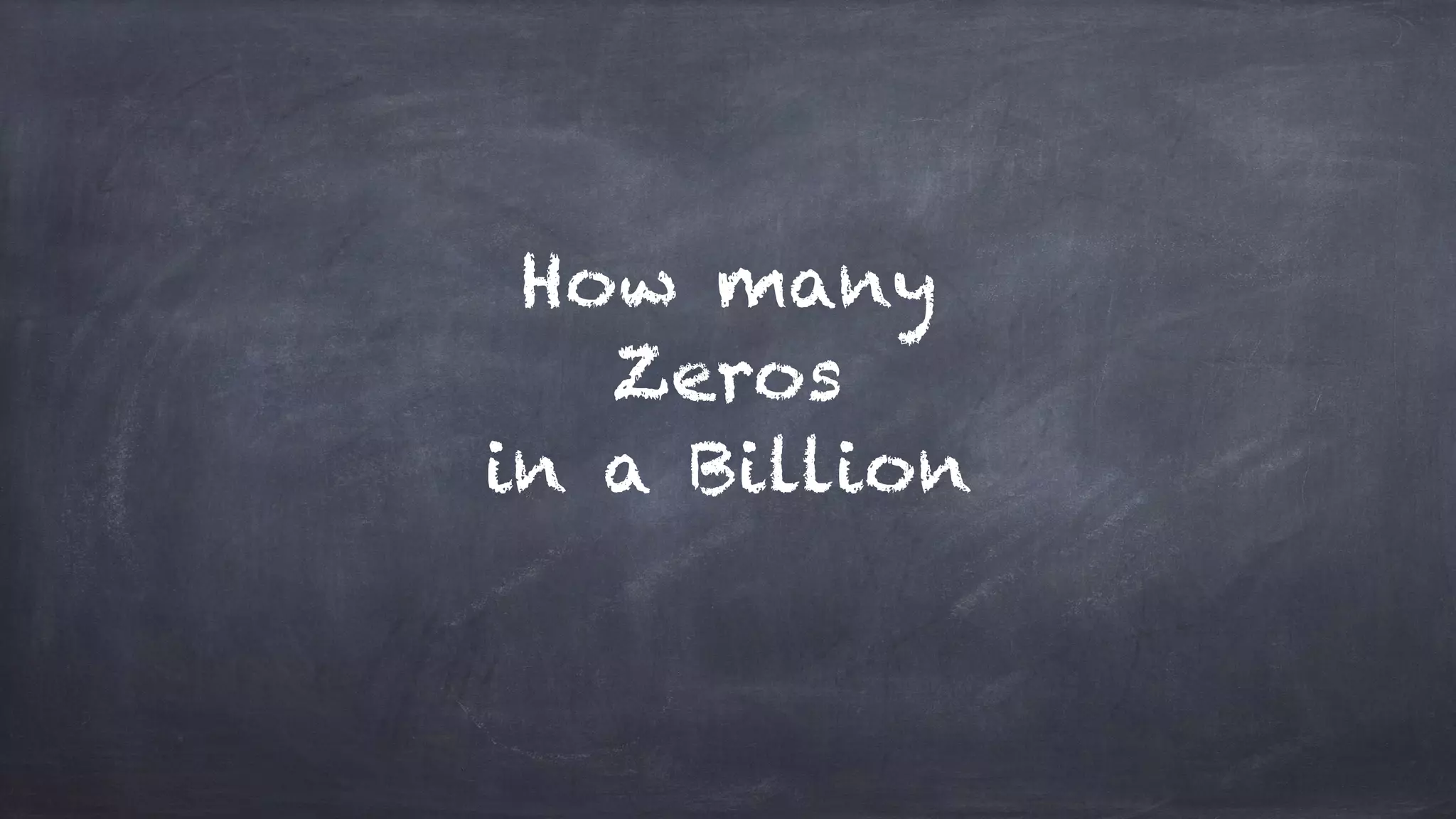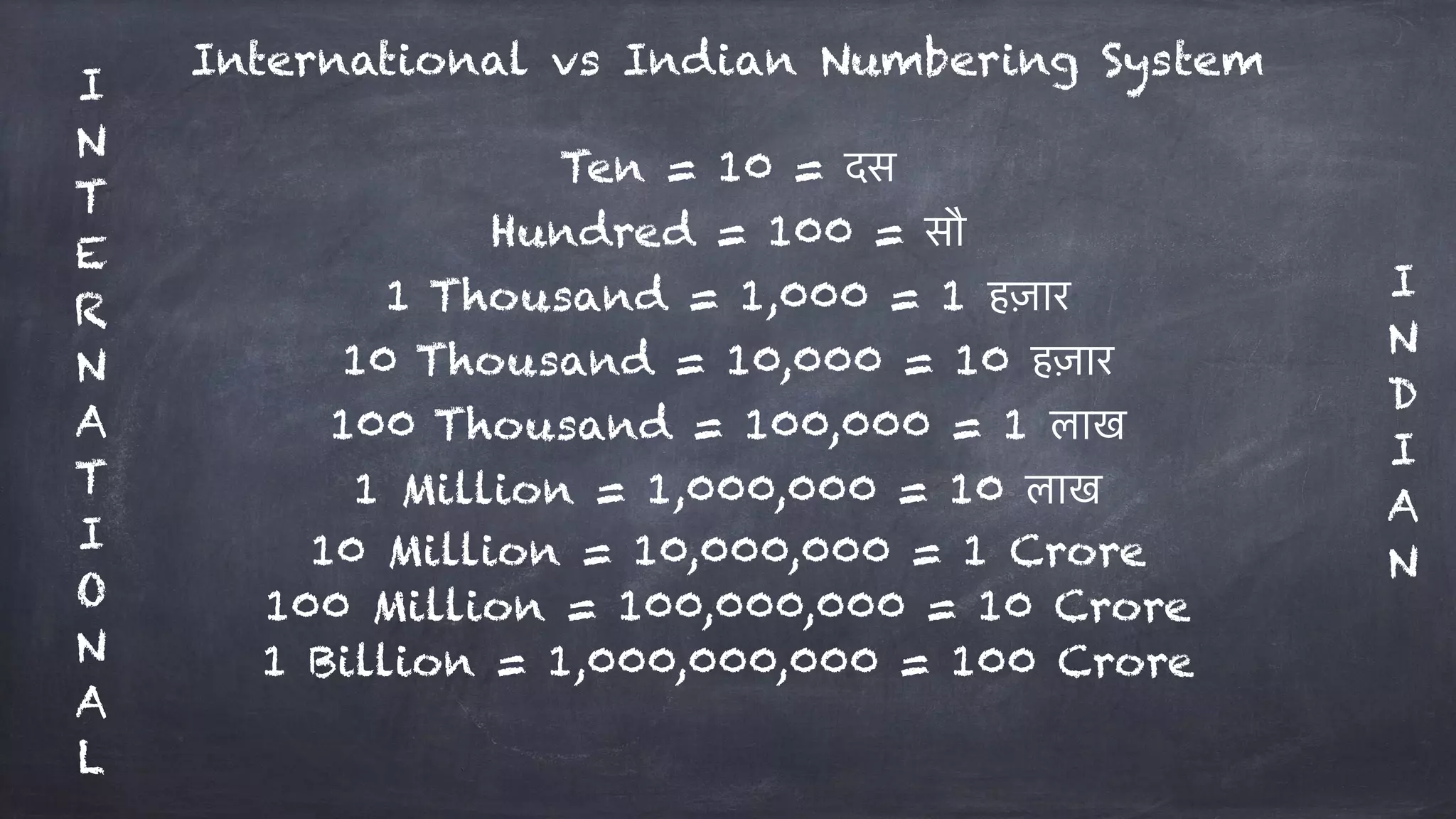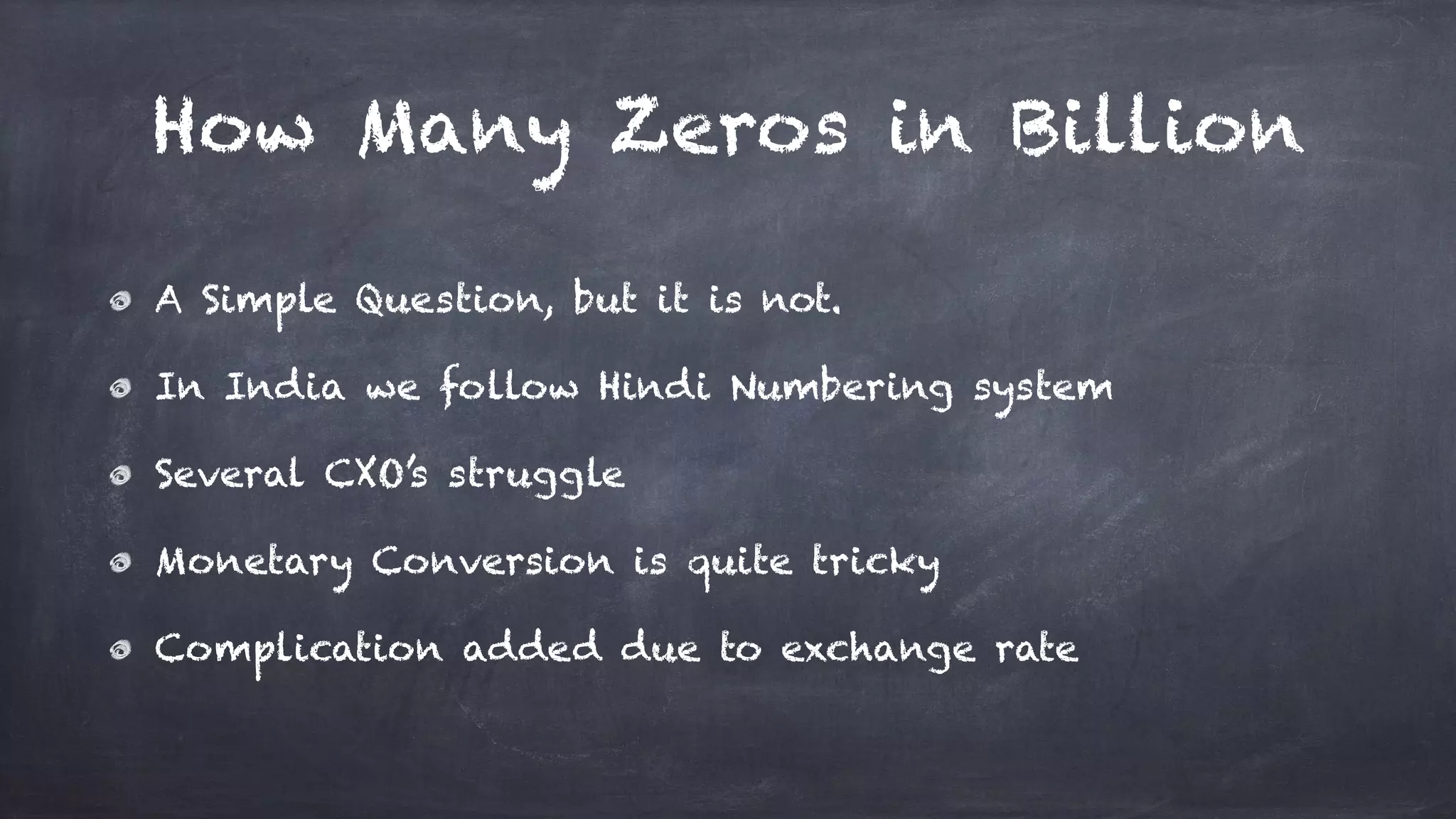How Many Zeros In A Billion - A Clear Look
Have you ever stopped to ponder the sheer size of a billion? It's a number we hear pretty often, especially when people talk about money or big populations, but what does it actually look like when you write it all out? Knowing how many zeros are in a billion can sometimes feel a bit like a math puzzle, yet it helps us grasp just how vast these amounts truly are. We're here to make sense of it all, giving you a straightforward way to picture this very large number and its many companions.
You see, numbers like a million, a billion, or even a trillion, they show up everywhere, from the news to casual chats about how much something costs. But getting a real feel for their size, particularly how many little circles follow the main digit, well, that can be a bit tricky. We'll be looking at how these numbers are put together, how they compare to each other, and some really interesting things about how different parts of the world count these big amounts. It's actually quite fascinating, in a way, how something so simple can have such varied forms.
So, get ready to explore the world of large numbers, especially focusing on our friend, the billion. We'll show you how many zeros are in a billion, talk about how it sits between other numbers like a million and a trillion, and even touch upon some cool differences in how people count zeros depending on where they live. It's a journey into numerical scale that, honestly, is quite practical for everyday life, too it's almost a kind of helpful skill to have.
- Sophie Rain Leakes
- Absarokee Days 2025 Schedule
- Kimmy Granger Ill Protect You
- Sarap Babe
- Tron Bonne Cumminham
Table of Contents
- How Many Zeros in a Billion Unpacked
- What Does a Billion Look Like in Numbers?
- How Do We Compare a Billion to Other Large Numbers?
- Understanding the Different Scales for How Many Zeros in a Billion
- How Do We Write and Read Big Numbers with Many Zeros?
- Practical Examples of How Many Zeros in a Billion
- Counting Zeros in Specific Billion Amounts
How Many Zeros in a Billion Unpacked
When we talk about a billion, the number of zeros involved is a pretty straightforward thing for most of us, especially in places like the United States. In this common way of counting, a billion has nine zeros. It's a big number, certainly, but it follows a pattern that's relatively easy to remember once you get the hang of it. This particular count of zeros is part of what people call the "short scale" system, which is used by many countries across the globe. So, basically, if someone mentions a billion, you can pretty much picture a one followed by nine little circles. That, is that, the standard way we generally think about it.
This idea of nine zeros is a key piece of information when you're trying to figure out how large a sum truly is. It helps us put things into perspective, whether we're talking about national budgets or the number of people living on our planet. Knowing this specific count helps us avoid confusion and makes conversations about really big figures much clearer. It’s a bit like knowing how many feet are in a mile; it just helps things make sense. In fact, this simple fact about how many zeros are in a billion is a pretty foundational piece of knowledge for understanding large numerical values.
What Does a Billion Look Like in Numbers?
So, if a billion has nine zeros, how do we actually write that down? It looks like this: 1,000,000,000. That's a one, followed by nine zeros. You can see how those zeros are often grouped in threes, separated by commas, which helps us read the number more easily. This grouping makes it simpler to count them up and makes the number less intimidating to look at, honestly. When we write it in a scientific way, it's expressed as 10^9, which just means a 1 followed by nine zeros. This way of writing it is quite compact and helpful for scientists or anyone dealing with truly massive numbers, like your typical astronomer.
- Mia Bailey Sex Video
- Flosaucevip Leak
- Mckinley Richardson Nude Pics
- All Uncut Web Series
- Angela Alvarez Onlyfans
This numerical representation, 1,000,000,000, is what's used in the short scale system. It's the standard way of writing and thinking about a billion for a good portion of the world. It means that if you see this number written out, you can be pretty sure it represents a thousand millions. It’s a very common way to represent such a large value, and, you know, it tends to be the one most people learn first. This clear pattern of a one and nine zeros is a good mental picture to keep in mind when dealing with such big figures.
How Do We Compare a Billion to Other Large Numbers?
A billion doesn't exist in a vacuum; it sits right there between other large numbers we use all the time. For instance, a million has six zeros. So, a billion is a thousand times bigger than a million, which is quite a jump! You add three more zeros to a million, and you get a billion. Then, if you add another three zeros to a billion, you get a trillion, which has twelve zeros. So, you have six zeros for a million, nine for a billion, and twelve for a trillion. It's a pretty neat progression, isn't it? It's like building blocks, where each step adds another group of three zeros. This pattern makes it, arguably, a bit easier to keep track of these very big numbers.
This comparison helps us get a better sense of scale. When someone says "a billion dollars," you can picture it as a thousand stacks of a million dollars each. And if they say "a trillion dollars," that's a thousand billions! The difference between these numbers is substantial, and understanding the zero count for each helps us grasp just how much bigger one is than the other. For example, a googol, which is a one followed by one hundred zeros, makes a billion seem, you know, just a little bit smaller in comparison. These comparisons really help put things into perspective, particularly when we're talking about how many zeros are in a billion compared to even larger figures.
Understanding the Different Scales for How Many Zeros in a Billion
Here's where things get a little bit interesting, and honestly, sometimes a bit confusing. Not everyone counts zeros in the same way for numbers like a billion. There are two main systems people use: the short scale and the long scale. The short scale is what we've been talking about, where a billion has nine zeros. This system is widely used in countries like the United States, Canada, and many English-speaking nations. It's fairly straightforward, with each new named number (like million, billion, trillion) being a thousand times bigger than the last. So, a million is 10^6, a billion is 10^9, and a trillion is 10^12. It’s a rather common way to think about these numbers, pretty much standard in certain parts of the world.
However, the long scale is different. In this system, a billion actually has twelve zeros, not nine. This is because in the long scale, each new named number is a million times bigger than the last, not a thousand times. So, a million is still 10^6, but then a billion (or 'milliard' as it's often called in these countries) would be 10^9, and then the next named number, a 'billion' in the long scale, is 10^12. This system is common in many European countries, like France and Germany, and also in some Spanish and Portuguese-speaking nations. It's important to know this difference, because if someone from a long-scale country says "a billion," they mean something much larger than someone from a short-scale country. It's a pretty significant distinction, and, you know, it can really change the meaning of a number.
Short Scale: How Many Zeros in a Billion?
As we've discussed, the short scale is the system where a billion is understood as a one followed by nine zeros. This is how numbers are typically counted in places like the United States. So, when you see 1,000,000,000, that's a billion in the short scale. A million has six zeros, so a billion is simply a thousand millions. This system is actually quite logical for everyday use, as it keeps the names of numbers moving up in increments of a thousand. It means that a "thousand million" gets its own new name, "billion." It's a very direct way of naming numbers, and, basically, it's what most people in the US learn in school.
This system also makes it quite simple to write out large numbers. You just add another three zeros for each step up the scale. Million (6 zeros), Billion (9 zeros), Trillion (12 zeros), Quadrillion (15 zeros), and so on. It's a consistent pattern that helps in remembering how many zeros belong to each named quantity. For instance, if you hear about a country's debt being in the trillions, you know it's a huge sum, with twelve zeros, because you're likely thinking in the short scale. This consistency, in a way, helps avoid a lot of potential confusion, especially when dealing with financial figures. So, yes, for how many zeros in a billion, the short scale answer is a firm nine.
Long Scale: How Many Zeros in a Billion?
Now, let's look at the long scale, where the number of zeros in a "billion" is different. In countries that use the long scale, a billion actually means 1,000,000,000,000, which is a one followed by twelve zeros. This is the same number that is called a "trillion" in the short scale system. This happens because the long scale system names numbers based on powers of a million. So, a "million" is 10^6, but then a "billion" is (10^6)^2, which means 10^12. This is a pretty big difference, isn't it? It means that if you're talking to someone from, say, the UK (which historically used the long scale, though it's largely shifted to the short scale now), their "billion" would be what you call a "trillion."
This distinction is incredibly important, especially when looking at old documents or communicating across different regions. For example, if a historical text from a long-scale country mentions a "billion" francs, it's referring to a much larger sum than a "billion" dollars in today's US context. The difference in zero count for how many zeros are in a billion can lead to significant misunderstandings if you're not aware of which system is being used. It's a rather fascinating aspect of how numbers are named and understood globally, and it really highlights the need for clarity when discussing large numerical values. So, for the long scale, the answer to how many zeros in a billion is twelve.
How Do We Write and Read Big Numbers with Many Zeros?
Writing and reading big numbers, like those with many zeros, can seem a bit daunting at first, but there are some simple tricks that make it much easier. One of the best ways is to group the zeros in threes, starting from the right. We use commas to separate these groups. So, for a billion (in the short scale), you write 1,000,000,000. You can see three groups of three zeros there. This makes it much simpler to read "one thousand million" or "one billion" without getting lost in a long string of zeros. It's a pretty standard practice, and, you know, it really helps with readability.
When you're reading these numbers aloud, you read each group of three. So, 1,000 is "one thousand," 1,000,000 is "one million," and 1,000,000,000 is "one billion." This method of grouping and naming makes it easier to compare numbers as well. You can quickly see that a number with nine zeros is bigger than one with six zeros, and so on. This simple visual cue, the grouping of zeros, is a powerful tool for anyone dealing with large figures, whether in finance or just trying to understand the news. It's actually a very practical way to approach these large numerical values, helping you quickly figure out how many zeros are in a billion or any other big number.
Practical Examples of How Many Zeros in a Billion
Sometimes, it helps to put these big numbers into a real-world context. For instance, have you ever wondered how long a billion seconds is? It's a surprisingly long time! A billion seconds is about 31.7 years. That's a pretty substantial chunk of a human lifespan. This helps us get a feel for just how massive a billion truly is, not just as a number on paper, but as a measure of time. It's a rather mind-bending thought, honestly, to consider that many seconds passing. This kind of practical example, in a way, makes the abstract concept of "nine zeros" a bit more tangible.
Another way to think about it is in terms of money. If you had a billion dollars, you could do an awful lot! It's a sum that's hard for most people to even imagine. Or consider population figures; countries with populations in the billions are truly massive. These real-life examples, from time to money to people, really highlight the scale of a billion. They show us that knowing how many zeros are in a billion isn't just a math fact; it's a piece of information that helps us understand the world around us. So, for example, when you hear about a company making a billion dollars in profit, you can really picture the scale of that achievement.
Counting Zeros in Specific Billion Amounts
Things can get a little bit trickier when you have a number like "200 billion" or "3.5 billion." How many zeros are in those? Let's break it down. For "200 billion," you start with the 200, which has two zeros. Then, a billion itself adds nine more zeros. So, 200 followed by nine zeros looks like 200,000,000,000. If you count all the zeros there, you'll find there are eleven of them. The two zeros from the "200" plus the nine from "billion" give you eleven. It's a pretty straightforward addition, really, once you remember the base number of zeros for a billion.
Now, what about "3.5 billion"? This one is a bit different because of the decimal point. When you write 3.5 billion, it's 3,500,000,000. If you count the zeros in that number, you'll find there are eight of them. The decimal point effectively "uses up" one of the nine zeros from the original billion, moving the "3" to the billions place and the "5" to the hundred millions place. So, the "5" essentially replaces a zero. It's a common point of confusion, but once you write it out, it becomes quite clear. So, basically, when you see a decimal, it shifts things around a little bit, changing the simple count of how many zeros are in a billion for that specific instance.
Another example from the source text mentions "50 billion." This would be written as 50,000,000,000. Here, you have the one zero from the "50" plus the nine zeros from the "billion," giving you a total of ten zeros. It's a pretty consistent pattern once you grasp it. Similarly, "400 billion" would have two zeros from the "400" plus the nine from the "billion," making eleven zeros in total. These examples really show how the initial digits of a number influence the final count of zeros when expressing a specific "billion" amount. It's actually quite simple to figure out, once you have the base knowledge of how many zeros are in a billion itself.



Detail Author:
- Name : Horacio Rutherford DVM
- Username : geovanni61
- Email : fjacobs@heathcote.biz
- Birthdate : 1970-03-10
- Address : 30506 Renner Ville Apt. 098 Considineberg, MD 41763-8521
- Phone : (470) 266-4296
- Company : Thiel-Volkman
- Job : Optometrist
- Bio : Qui unde expedita fugit sit et ratione excepturi. Est ut omnis molestias cumque id. Et fugit quam sint error animi et. Pariatur modi maxime impedit quia. Et voluptas est maiores vel.
Socials
instagram:
- url : https://instagram.com/fadelk
- username : fadelk
- bio : Tenetur et eligendi blanditiis est et et. Esse et rem quo perspiciatis.
- followers : 6135
- following : 879
linkedin:
- url : https://linkedin.com/in/krystel3282
- username : krystel3282
- bio : Enim non architecto minima est nostrum.
- followers : 2963
- following : 2746
tiktok:
- url : https://tiktok.com/@krystel_fadel
- username : krystel_fadel
- bio : Qui amet molestiae neque ipsa ad et laboriosam.
- followers : 1991
- following : 2718